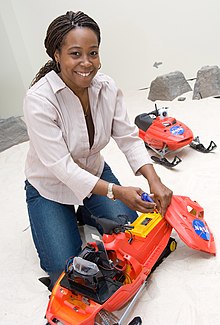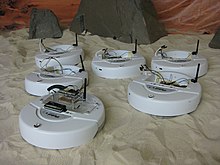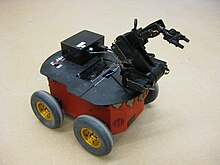Ayanna Howard
Ayanna Howard | |
|---|---|
 | |
| Born | January 24, 1972 |
| Nationality | American |
| Alma mater | |
| Scientific career | |
| Fields | |
| Institutions | |
| Doctoral advisor | George A. Bekey |
Ayanna MacCalla Howard (born January 24, 1972) is an American roboticist, entrepreneur and educator currently serving as the dean of the College of Engineering at Ohio State University. Assuming the post in March 2021, Howard became the first woman to lead the Ohio State College of Engineering.[1][2]
Howard previously served as the chair of the School of Interactive Computing in the Georgia Tech College of Computing, the Linda J. and Mark C. Smith Endowed Chair in Bioengineering in the School of Electrical and Computer Engineering, and the director of the Human-Automation Systems (HumAnS) Lab.[3]
Early life and education
As a little girl Howard was interested in aliens and robots and her favorite TV show was The Bionic Woman.[4] Howard received her B.S. in engineering from Brown University in 1993 and her M.S. and Ph.D. in electrical engineering from the University of Southern California in 1994 and 1999, respectively.[5] Her thesis Recursive Learning for Deformable Object Manipulation was advised by George A. Bekey. Howard also has an MBA from Claremont Graduate University.[1]
Career
Howard's early interest in artificial intelligence led her to a senior position at Seattle-based Axcelis Inc, where she helped develop Evolver, the first commercial genetic algorithm, and Brainsheet, a neural network developed in partnership with Microsoft. From 1993 to 2005, she worked at the NASA Jet Propulsion Laboratory[6] where she held multiple roles including senior robotics researcher and deputy manager in the Office of the Chief Scientist.[1]
She joined Georgia Tech in 2005 as an associate professor and the founder of the HumAnS lab. She has also served as the associate director of research for Georgia Tech's Institute for Robotics and Intelligent Machines and as chair of the multidisciplinary robotics Ph.D. program at Georgia Tech. In 2017 she became the chair of the School of Interactive Computing at Georgia Tech.[3]
In 2008, she received worldwide attention for her SnoMote robots, designed to study the impact of global warming on the Antarctic ice shelves.[7] In 2013, she founded Zyrobotics, which has released their first suite of therapy and educational products for children with special needs.[8]
Howard has authored 250 publications in refereed journals and conferences, including serving as co-editor/co-author of more than a dozen books and/or book chapters.[9] She has also been awarded four patents and has given over 140 invited talks and/or keynotes.[9] She is a fellow of the Association for the Advancement of Artificial Intelligence (AAAI) and the Institute of Electrical and Electronics Engineers (IEEE).[9] Among her many honors, Howard received the Computer Research Association's A. Nico Habermann Award and the Richard A. Tapia Achievement Award.[9]
In a 2020 interview on Marketplace, Howard outlined the ways in which companion robots would fill the gap left by social distancing as a result of the COVID-19 pandemic in the United States.[10]
On November 30, 2020, the Columbus Dispatch reported Howard has been named the next dean of the College of Engineering at Ohio State University, to begin March 1, pending approval by the board of trustees.[11] On March 1, 2021, Howard assumed the role becoming the first woman to hold the position.[1]
In 2021, Ayanna Howard received the Athena Lecturer Award from Association for Computing Machinery (ACM) for her Contributions to Robotics, AI and Broadening Participation in Computing.[9] In June 2022, Howard was elected a trustee of Brown University.[12]
Research
Howard's research interests include human-robot interaction, assistive/rehabilitation robotics, science-driven/field robotics, and perception, learning, and reasoning.[13]
Howard's research and published works span across various topics in robotics and AI, including intelligent learning, virtual reality for rehabilitation and robotics in the role of pediatric therapy. Her research is highlighted by her focus on technology development for intelligent agents that must interact with and in a human-centered world. This work, which addresses issues of human-robot interaction, learning, and autonomous control, has resulted in more than 200 peer-reviewed publications.[3]


Honors and awards
Howard's numerous accomplishments have been documented in more than a dozen featured articles. In 2003, she was named to the MIT Technology Review TR100 as one of the top 100 innovators in the world under the age of 35.[14][15] She was featured in Time magazine's "Rise of the Machines" article in 2004.[16] She was also featured in the USA Today Science & Space article.[17]
Some of Howard's awards include:
- Lew Allen Award for Excellence (formerly the Director's Research Achievement Award of the Jet Propulsion Laboratory) for significant technical contributions, 2001 [18]
- MIT Technology Review Top 100 Young Innovators of the Year, 2003[14][15]
- NAE Gilbreth Lectureship, 2010[19]
- A. Richard Newton Educator ABIE Award, Anita Borg Institute, 2014[20][21][22]
- Computer Research Association's A. Nico Habermann Award, 2016[23]
- Brown Engineering Alumni Medal (BEAM), 2016[24]
- AAAS-Lemelson Invention Ambassador, 2016-2017[25]
- Atlanta magazine's Women Making a Mark, 2017[6]
- Walker's Legacy #WLPower25 Atlanta Award, 2017[26]
- Forbes America's Top 50 Women In Tech, 2018[27]
- ACM Athena Lecturer Award, 2021[9]
- 2021 class of Fellows of the American Association for the Advancement of Science.[28]
- IEEE Fellow, 2021, "for contributions to human-robot interaction systems"[29]
- 2023 AAAI/EAAI Patrick Henry Winston Outstanding Educator Award
References
- ^ a b c d "Ayanna Howard named next dean of College of Engineering". Ayanna Howard named next dean of College of Engineering. Retrieved 2021-01-20.
- ^ "About Dean Ayanna Howard". COLLEGE OF ENGINEERING. 2021-01-07. Retrieved 2022-02-22.
- ^ a b c "College of Computing Selects Ayanna Howard to Lead School of Interactive Computing". www.news.gatech.edu. Retrieved 2018-02-03.
- ^ Rizzo, Meredith (19 December 2017). "Being Different Helped A NASA Roboticist Achievement Her Dream". NPR.
- ^ "Ayanna Howard | The HistoryMakers". www.thehistorymakers.org. Retrieved 2018-02-03.
- ^ a b "Ayanna Howard". Atlanta.
- ^ GT | Robots Go Where Scientists Fear to Tread Archived May 31, 2008, at the Wayback Machine
- ^ "Ayanna Howard – Roboticist". Georgia Institute of Technology. Retrieved 2024-10-31.
- ^ a b c d e f "Ayanna Howard Publications". awards.acm.org. Retrieved 2021-05-13.
- ^ "Robots are getting personal during the pandemic". Marketplace. Retrieved 2020-08-08.
- ^ "Ohio State names new engineering dean, first woman in role". Columbus Dispatch. Retrieved 2020-11-30.
- ^ "Brown Corporation elects two new fellows, eight trustees". Brown University. Retrieved 2022-06-07.
- ^ "Ayanna MacCalla Howard | School of Electrical and Computer Engineering at the Georgia Institute of Technology". www.ece.gatech.edu. Retrieved 2018-02-03.
- ^ a b "2003 Young Innovators Under 35". Technology Review. 2003. Retrieved August 16, 2011.
- ^ a b "2003 Young Innovators - Ayanna Howard, 31". Retrieved 8 April 2019.
- ^ Cray, Dan; C. Miranda; W. Rothman; Oko Sekiguchi (June 6, 2004). "Rise of the Machines". Time. Archived from the original on March 26, 2005. Retrieved 2008-04-06.
- ^ "New breed of robots could soon wander Antarctica". Retrieved 2008-05-29.
- ^ "The Lew Allen Award for Excellence: List of Recepients(sic)". Jet Propulsion Laboratory. Archived from the original on 4 December 2016. Retrieved 26 June 2018.
- ^ "Armstrong Endowment for Young Engineers - Gilbreth Lectures". National Academy of Engineering. Retrieved 31 July 2018.
- ^ "Educational Innovation Abie Award in Honor of A. Richard Newton". AnitaB.org. Archived from the original on 31 July 2018. Retrieved 31 July 2018.
- ^ "Ayanna Howard". Anita B.org.
- ^ "ABIE Awards, Celebrate the achievements of women in tech!". Anita B.org. Archived from the original on 2017-08-07. Retrieved 2017-08-07.
- ^ "2016 CRA Distinguished Service and A. Nico Habermann Awardees Announced". Computer Research Association. 25 February 2016. Retrieved 31 July 2018.
- ^ [1] Brown School of Engineering Magazine, Summer 2016
- ^ "AAAS and The Lemelson Foundation announce the 2016-2017 Class of Invention Ambassadors 1 June 2016". AAAS. Retrieved 31 July 2018.
- ^ "25 Women Mobilizing the Atlanta Community". Walkers Legacy. Archived from the original on 31 July 2018. Retrieved 31 July 2018.
- ^ "America's Top 50 Women In Tech". Forbes. Retrieved 2022-02-22.
- ^ "2021 Fellows". American Association for the Advancement of Science. Retrieved 2022-01-28.
- ^ "Newly elevated Fellow class 2021" (PDF). IEEE. Archived from the original (PDF) on December 6, 2020. Retrieved 2023-04-27.
